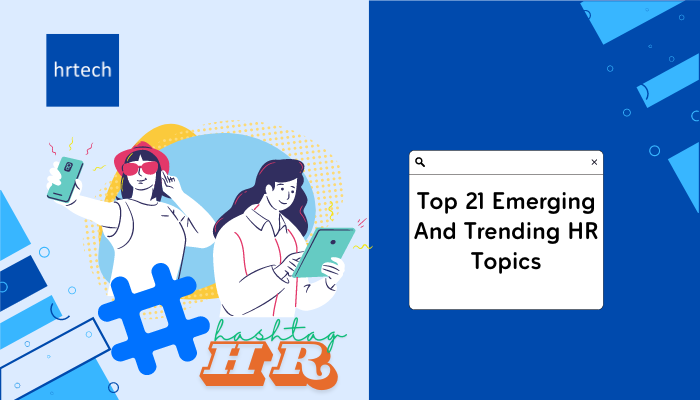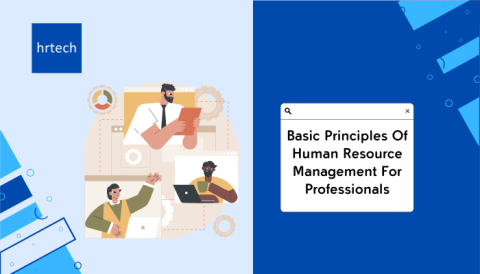Introduction
The Human Resources landscape is experiencing a seismic shift in 2025.
The traditional HR playbook—focused on hiring, firing, and compliance—is being rewritten to prioritize people-centric strategies, technology-driven processes, and agile responses to change. The rise of Gen Z in the workforce, the increasing use of AI, and the shift to hybrid and remote models mean HR professionals must rethink how they engage, manage, and support talent.
Whether you’re an HR professional, a startup founder building your first team, or a corporate leader navigating global talent challenges, this comprehensive guide breaks down the top 21 emerging and trending HR topics in 2025 you absolutely need to watch.
1. AI-Driven HR Processes
Artificial Intelligence is streamlining tasks once done manually—resume filtering, interview scheduling, chatbots for candidate queries, and performance forecasting.
Example: Tools like HireVue or Pymetrics analyze facial expressions and responses to assess candidate fit.
Why it matters: It saves time, reduces unconscious bias (when designed right), and allows HR teams to focus on strategic decisions rather than repetitive tasks.
2. Skills-Based Hiring Over Degree-Centric Recruitment
2025 marks a significant shift from resumes and degrees to practical skills and real-world competencies.
Example: Companies like Google, Tesla, and IBM already hire without requiring college degrees. Platforms like Coursera and LinkedIn Learning help candidates showcase their credentials.
Bonus Insight: Skill verification tools and skill-based job boards are booming, enabling HR teams to make better matches.
3. Employee Experience (EX) Personalization
Much like Netflix recommends shows based on preferences, HR platforms now personalize everything—training content, benefits, communication style, and even career growth plans.
Tactics to personalize EX:
- AI-driven engagement surveys
- Personalized onboarding journeys
- Improve employee engagement
- Adaptive learning systems
4. Workplace Mental Health and Resilience Programs
Companies are moving from reactive support (like EAPs) to proactive mental wellness.
Trending additions:
- Daily mindfulness check-ins
- Mental health days in official calendars
- Resilience workshops
- Anonymous peer-support apps like Spill or BetterUp
5. Hybrid Work Culture Optimization
It’s not just about remote work anymore—it’s about doing hybrid work well.
Key focus areas:
- Redefining productivity without presenteeism
- Equal opportunity and visibility for remote workers
- Creating inclusive “mixed mode” meeting setups
- Virtual watercooler initiatives to replace in-office culture
6. People Analytics and Data-Driven HR
Gone are the days of gut-based decisions. People analytics provides actionable insights into hiring funnels, retention risks, performance, and workforce planning.
Examples of metrics:
- Flight risk scoring
- Talent pipeline velocity
- Engagement score fluctuations
- DEI progress heat maps
7. DEI 2.0 – Beyond the Basics
DEI is no longer a checkbox. Companies are tying DEI KPIs to executive compensation and embedding inclusivity in decision-making, not just hiring.
New directions include:
- Inclusion audits
- DEI dashboards visible to all employees
- Real-time bias tracking in hiring algorithms
8. Internal Talent Mobility and Upskilling
2025 is the year of career fluidity. Employees want to switch roles internally without hitting a wall.
Internal mobility trends:
- AI-powered career pathing tools
- Upskilling credits for internal courses
- Project-based gigs within departments
- Intra-company mentorship platforms
9. HR in the Metaverse
Yes, the Metaverse is becoming an HR playground. From VR onboarding to gamified compliance training, it offers immersive ways to engage employees—especially younger digital-native talent.
Use cases:
- Hosting town halls in virtual spaces
- Conducting remote interviews in VR
- Onboarding walkthroughs in a virtual office
10. Remote Leadership and Digital Management Training
Being a good leader in 2025 means mastering asynchronous communication, trust-building at a distance, and digital-first empathy.
What’s trending:
- Leadership bootcamps for remote management
- Virtual coaching subscriptions
- “Video on, judgment off” training for Zoom fatigue
11. HR Tech Stack Integration and Automation
No more jumping between 10 tools. HR leaders are seeking centralized systems that speak to each other—reducing friction, cost, and errors.
Popular integrations:
- Slack with HR chatbots
- ATS + LMS + Payroll integration
- No-code HR automation tools like Zapier and Workato
12. Pay Transparency and Equity Audits
Expect employees to demand clear, upfront salary bands—and for organizations to respond with publicly available compensation policies.
New pay practices include:
- Publishing pay ranges on job listings
- Conducting quarterly equity audits
- Implementing “no negotiation” hiring to eliminate bias
13. Flexible Work Schedules and Four-Day Workweeks
People are working smarter, not longer. Output-driven models are becoming the norm across industries.
Adoption examples:
- Bolt, Buffer, and Kickstarter have embraced 4-day weeks
- Flex hours are replacing rigid 9–5s
- Some firms offer “core hours” policies to sync global teams
14. HR’s Role in ESG Strategy
HR is now a core driver of ESG (Environmental, Social, Governance) goals.
How HR contributes:
- Creating green office initiatives
- Embedding ethics in hiring and vendor selection
- Driving workforce diversity targets
15. Fractional and On-Demand HR Services
Startups and remote-first companies are embracing on-demand HR teams instead of full-time hires.
Benefits:
- Access to niche HR expertise
- Cost-efficiency for growing teams
- Flexibility to scale HR functions as needed
16. Employer Branding and Talent Marketing
Recruitment is now marketing. Top candidates evaluate your brand as much as you evaluate them.
Hot tactics:
- Employee-generated content on social media
- “Day in the life” videos
- Glassdoor and Indeed reputation management
17. AI Ethics and Compliance in HR
Using AI in hiring, performance tracking, or engagement must be ethical, explainable, and transparent.
Watch-outs:
- Bias in algorithmic hiring tools
- Data privacy concerns in employee monitoring
- Compliance with laws like the EU AI Act and U.S. FTC guidelines
18. Neurodiversity and Inclusive Hiring Practices
Neurodiversity hiring is more than a trend—it’s a movement to tap into overlooked talent.
HR best practices:
- Structured interviews with sensory-friendly options
- Job descriptions free from vague soft skills
- Strength-based performance evaluations
19. Global Workforce Management and EOR Solutions
With talent available worldwide, Employer of Record (EOR) services like Deel, Remote, and Oyster make hiring across borders easier.
Why it’s trending:
- Avoids local legal headaches
- Helps scale globally faster
- Provides localized benefits and compliance
20. Returnship and Second-Career Programs
Returnships provide a path for people re-entering the workforce after breaks—especially mid-career professionals, caregivers, and career switchers.
Successful examples:
- Goldman Sachs’ Returnship program
- Path Forward (nonprofit for tech returnships)
Benefits:
- Taps into experienced, loyal talent pools
- Supports DEI initiatives
- Fills skills gaps with minimal onboarding
21. Ethical Surveillance and Employee Monitoring
Productivity software like Time Doctor and Hubstaff is everywhere—but ethics matter more than ever.
Guidelines for ethical monitoring:
- Inform employees clearly and get consent
- Track output, not keystrokes
- Balance transparency with autonomy
Bonus Trend: The Rise of CHROs as Strategic Business Leaders
The Chief Human Resources Officer (CHRO) has officially taken a seat at the C-suite table. In 2025, CHROs are business leaders—not just people leaders—driving decisions on M&A, tech investment, and long-term growth strategy.
Key responsibilities now include:
- Leading digital transformation for HR
- Shaping company culture during crises
- Influencing board-level diversity and succession planning
Conclusion
The HR department is no longer a backend function—it’s the heartbeat of modern organizations. These 21+ trends are not just passing fads. They represent a deeper, fundamental shift in how people work, connect, and grow.
From embracing AI to prioritizing mental wellness and leading ESG initiatives, HR professionals in 2025 have more influence—and responsibility—than ever before.
So whether you’re refining your company culture, upgrading your HR tech stack, or preparing for the future of hybrid teams, remember this: the future of HR is not about managing people—it’s about empowering them.





